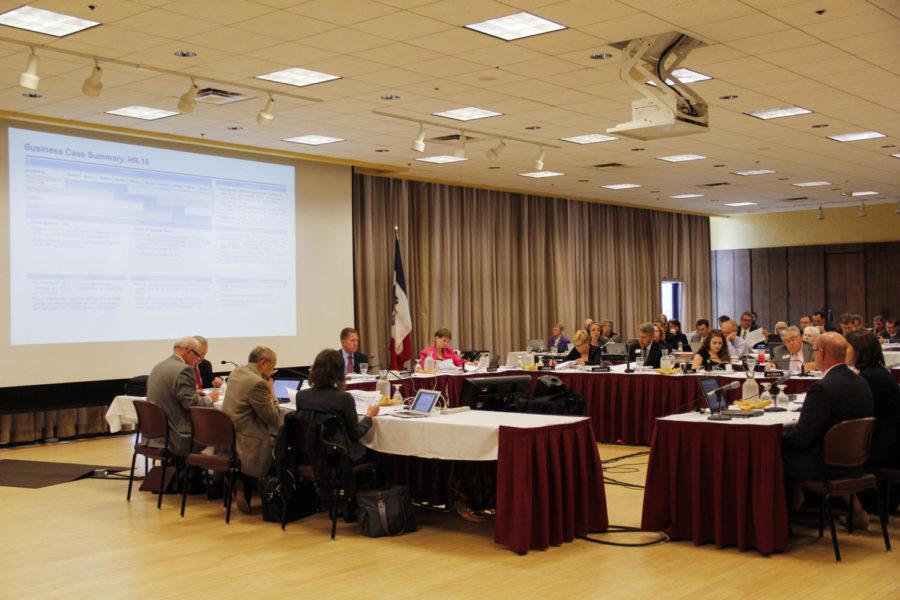Board of Regents to review potential analytics program
Representatives from Deloitte give an update on the TIER study at the Board of Regents meeting Sept. 10 in the Sun Room of the Memorial Union.
February 4, 2015
Iowa State University is requesting a new master of business analytics program at the February Board of Regents meeting to provide training on analyzing “big data” in organizations.
The Board of Regents will meet Feb. 4 to 5 in Cedar Falls. The Education and Student Affairs Committee will meet Feb. 4 and the Property and Facilities Committee and open session will be Feb. 5.
The Education and Student Affairs Committee is scheduled to begin at 3:30 p.m.
The proposed business analytics program goal is to teach students how to do predictive modeling, analytical reporting, fraud detection, risk management, text mining and more.
“The academic objective of the proposed program is to educate business professionals and future leaders with a unique ability to analyze business-related data that exhibit high volume, variety and velocity,” according to the Board of Regent agenda item.
The program proposal comes from an increased need in people who can decipher big data.
By 2018, the United States could see a shortage of 140,000 to 190,000 people with deep analytical skills, according to the McKinsey Global Institute.
The program is expected to have 20 students in the first year and up to 80 by its seventh year. Most students would be distance education students.
If the board approves the program, Iowa State plans on including the program in the fall 2015 course catalog.
The Education and Student Affairs Committee will also receive the 2013-14 distance education report.
Iowa State has found an increased need in online learning opportunities for the student body.
“Online enrollments are becoming more popular for both on-campus and distance-based students,” according to the agenda item. “Online components in traditional courses are becoming more common and may be a key to stimulating more acceptance of distance-based educational models and collaboration between the Regent universities as well as with community colleges.”
The number of ISU students taking distance education classes only has increased from 6,324 in 2011 to 7,280 in 2014. The number of students taking a mix of traditional and distance education classes increased from 5,302 in 2011 to 11,353 in 2014.
A 2013-2014 faculty resignation report found that 35 faculty members resigned last year, compared to 21 the year before.
The university reaches out to those resigning for an opportunity for a face-to-face or phone exit interview to discuss why the faculty member is resigning. Of the 35 resignees, 20 responded. The main reasons for resignations were dissatisfaction with department environment, lack of advancement opportunities and a dissatisfaction with pay.
“It can be that all those are somehow connected,” said Dawn Bratsch-Prince in a former Daily interview about faculty resignations. “The department chair is the leader of the department, so if someone is unhappy with their workload or pay, it’s not surprising that they would maybe articulate that as dissatisfaction with the department chair.”
Of the 20 who were interviewed, eight said they accepted a new position that will provide a “much higher salary than the salary at ISU” and seven said they accepted a new position that will provide a salary “somewhat higher than the salary at ISU,” according to the regents agenda item.
Faculty dissatisfaction with the department chair has prompted the ISU Provost Office to hold a series of department chair development workshops, which have been held for a few years, featuring topics as preparing promotion and tenure cases.
“It’s a program to support our department chairs to provide them with information on how to foster a positive and supportive department culture for all faculty,” Bratsch-Prince said.
Anyone can listen to the meeting streamed online at regents.iowa.gov.

















